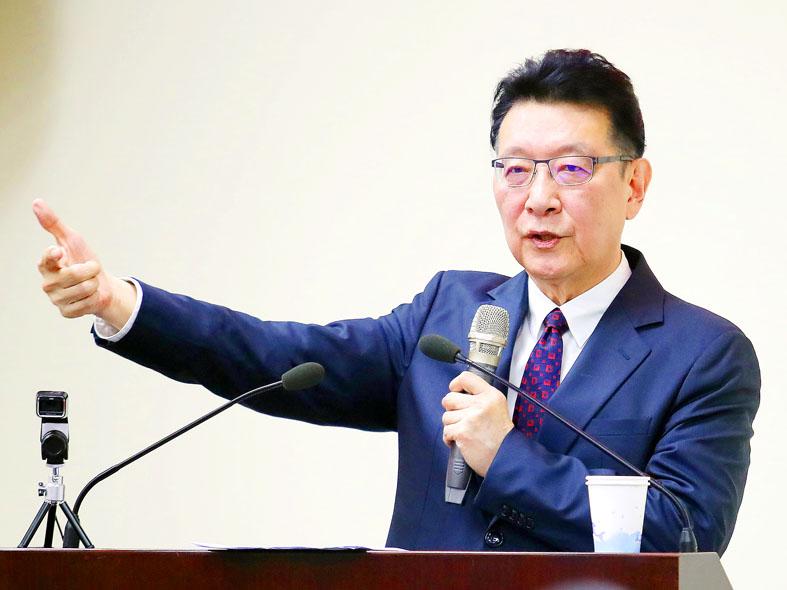Broadcasting Corp of China chairman Jaw Shaw-kong (趙少康) yesterday said he would not be running for chairman of the Chinese Nationalist Party (KMT).
He had initially expressed an interest in seeking the position with the intention of “saving the party and the country,” said Jaw, who rejoined the KMT in February.
However, there was no need for the KMT Central Standing Committee to revise a requirement in the party’s election regulations stipulating that a chairperson candidate must have been a party member for at least one year, he said.

Photo: CNA
He would not be running for KMT chairperson regardless of whether the committee modifies the rules of the chairperson election, which is expected to take place in July, “because there is more than one way to serve the country,” he said.
Jaw, a former lawmaker, said he had been a member of the KMT for more than two decades before leaving it in 1993 to cofound the New Party.
After losing the Taipei mayoral race to then-Democratic Progressive Party (DPP) candidate Chen Shui-bian (陳水扁) in 1994, Jaw retired from politics and became a media personality who now hosts several political talk shows on radio, television and the Internet.
Jaw announced his decision at a meeting of the KMT Central Standing Committee to which he had been invited.
In his speech to the committee, titled “Peace, Endeavor, Save Taiwan,” he outlined his criticisms of the KMT and the DPP, and cited the crises facing the nation as grounds for his return to politics.
He listed the closure last year of the CTi News channel and the appointment of Wu Ming-hung (吳明鴻), a cousin-in-law of President Tsai Ing-wen (蔡英文), as head of the Supreme Administrative Court, as examples of what he referred to as the DPP’s “authoritarian” ways.
He also accused the DPP of corruption and said that its “anti-China” position had “pushed Taiwan into a very dangerous position.”
No one, including the KMT, is keeping the DPP’s power in check, Jaw said, accusing the DPP of failing to take care of disadvantaged groups, respect democracy or insist on peace.
He believed the nation’s economy was overly dependent on China, while its military was overly dependent on the US, he added.
Despite the DPP “doing so badly,” the KMT continues to lose elections in part because it is “too old and too conservative,” and “too far away from the people,” Jaw said.
The KMT “is already in opposition, [but] still thinks it is in power,” he said.
He described the KMT as being simultaneously afraid of the DPP and the Chinese Communist Party, and afraid of loudly stating its own position and contributions to the nation.
Even if the KMT is united, it might not necessarily win, Jaw said, but added that without unity within the party, it was certain to lose.
He called for a “thorough reform” of the KMT.
In his recommendations to the committee, he said it would be best if being the chairperson was the KMT chairperson’s sole duty when the party is in opposition.
However, the president should be allowed to double as KMT chairperson when the party is in power, he said.
He also reiterated a previous suggestion that the KMT reduce the number of people on its Central Standing Committee.

The Grand Hotel Taipei on Saturday confirmed that its information system had been illegally accessed and expressed its deepest apologies for the concern it has caused its customers, adding that the issue is being investigated by the Ministry of Justice Investigation Bureau. The hotel said that on Tuesday last week, it had discovered an external illegal intrusion into its information system. An initial digital forensic investigation confirmed that parts of the system had been accessed, it said, adding that the possibility that some customer data were stolen and leaked could not be ruled out. The actual scope and content of the affected data

‘LIKE-MINDED PARTNER’: Tako van Popta said it would be inappropriate to delay signing the deal with Taiwan because of China, adding he would promote the issue Canadian senators have stressed Taiwan’s importance for international trade and expressed enthusiasm for ensuring the Taiwan-Canada trade cooperation framework agreement is implemented this year. Representative to Canada Harry Tseng (曾厚仁) in an interview with the Central News Agency (CNA) said he was increasingly uneasy about Ottawa’s delays in signing the agreement, especially as Ottawa has warmed toward Beijing. There are “no negotiations left. Not only [is it] initialed, we have three versions of the text ready: English, French and Mandarin,” Tseng said. “That tells you how close we are to the final signature.” Tseng said that he hoped Canadian Prime Minister Mark Carney

POSITIVE DEVELOPMENT: Japan and the US are expected to hold in-depth discussions on Taiwan-related issues during the meeting next month, Japanese sources said The holding of a Japan-US leaders’ meeting ahead of US President Donald Trump’s visit to China is positive news for Taiwan, former Japan-Taiwan Exchange Association representative Hiroyasu Izumi said yesterday. After the Liberal Democratic Party’s landslide victory in Japan’s House of Representatives election, Japanese Prime Minister Sanae Takaichi is scheduled to visit the US next month, where she is to meet with Trump ahead of the US president’s planned visit to China from March 31 to April 2 for a meeting with Chinese President Xi Jinping (習近平). Japan and the US are expected to hold in-depth discussions on Taiwan-related issues during the

President William Lai (賴清德) yesterday bestowed one of Taiwan’s highest honors on Saint Vincent and the Grenadines (SVG) Ambassador Andrea Clare Bowman in recognition of her contributions to bilateral ties. “By conferring the Order of Brilliant Star with Grand Cordon on Ambassador Bowman today, I want to sincerely thank her, on behalf of the Taiwanese people, for her outstanding contribution to deepening diplomatic ties between Taiwan and SVG,” Lai said at a ceremony held at the Presidential Office in Taipei. He noted that Bowman became SVG’s first ambassador to Taiwan in 2019 and